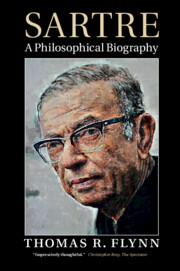Book contents
- Frontmatter
- Dedication
- Contents
- Preface
- Acknowledgments
- Abbreviations
- 1 The childhood of a genius
- 2 An elite education: student, author, soldier, teacher
- 3 Teaching in the lycée, 1931–1939
- 4 First triumph: The Imagination
- 5 Consciousness as imagination
- 6 The necessity of contingency: Nausea
- 7 The war years, 1939–1944
- 8 Bad faith in human life: Being and Nothingness
- 9 Existentialism: the fruit of liberation
- 10 Ends and means: existential ethics
- 11 Means and ends: political existentialism
- 12 A theory of history: Search for a Method
- 13 Individuals and groups: Critique of Dialectical Reason
- 14 A second ethics?
- 15 Existential biography: Flaubert and others
- Conclusion: the Sartrean imaginary, chastened but indomitable
- Select bibliography
- Index
- References
6 - The necessity of contingency: Nausea
Published online by Cambridge University Press: 18 December 2014
- Frontmatter
- Dedication
- Contents
- Preface
- Acknowledgments
- Abbreviations
- 1 The childhood of a genius
- 2 An elite education: student, author, soldier, teacher
- 3 Teaching in the lycée, 1931–1939
- 4 First triumph: The Imagination
- 5 Consciousness as imagination
- 6 The necessity of contingency: Nausea
- 7 The war years, 1939–1944
- 8 Bad faith in human life: Being and Nothingness
- 9 Existentialism: the fruit of liberation
- 10 Ends and means: existential ethics
- 11 Means and ends: political existentialism
- 12 A theory of history: Search for a Method
- 13 Individuals and groups: Critique of Dialectical Reason
- 14 A second ethics?
- 15 Existential biography: Flaubert and others
- Conclusion: the Sartrean imaginary, chastened but indomitable
- Select bibliography
- Index
- References
Summary
We have witnessed Sartre’s initial encounter with and subsequent haunting by the problem of contingency. Years later he will insist that “the essential nature of faticity is for each individual the necessity of his contingency. If we can rely on Sartre’s memory, he first experienced this phenomenon as a child when leaving the movie theater where he had witnessed the “necessity” of a narrative contained in the spool of film on the projector’s wheel. The contrast with the randomness and unpredictability of the world to which he returned on leaving the theater shocked him profoundly. He carried the effects of this experience in his “factum” (as the Normaliens used to call their polemical pamphlets) on contingency for the next two decades, depositing them in the novel that made his reputation.
One of the few works by which Sartre would later admit he hoped to be remembered, Nausea is the paradigm of a philosophical novel. It embodies the tension between philosophy and literature, concept and image, life and art, that marked much of his public life. It was Beauvoir who convinced him to transform his projected theoretical treatise on contingency into a novel. Sartre had been working on the second version of his “factum” while in Berlin, balancing his morning study of Husserl’s Ideas I with reflections on contingency later in the day. Commentators differ as to whether the relation between Husserlian phenomenology and the novel is one of “influence” or rather “convergence” in the sense that both contribute to Sartre’s plan to articulate the metaphysical experience of contingency. Those in favor of the convergence hypothesis cite the fact that Sartre’s “factum” on contingency predates his famous encounter with Aron in the café that supposedly introduced him to phenomenology.
- Type
- Chapter
- Information
- SartreA Philosophical Biography, pp. 137 - 161Publisher: Cambridge University PressPrint publication year: 2014

